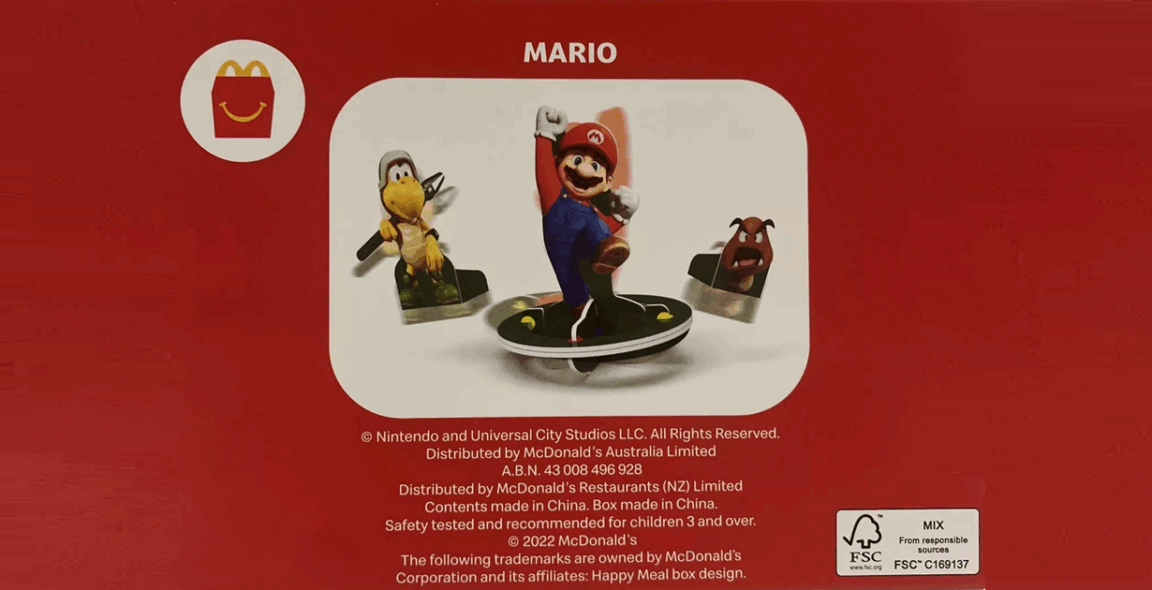I’ve been working in marketing for well over a decade now and have written extensively about brands pivoting their strategies, often with mixed results. But McDonald’s Australia’s recent Happy Meal toy saga might be one of the most predictable backflips I’ve seen in consumer marketing.
Let me take you back to September 2021. McDonald’s made a big, splashy announcement that they’d be phasing out plastic Happy Meal toys globally by the end of 2025. The commitment was ambitious: a 90% reduction in virgin fossil fuel-based plastic use against a 2018 baseline, which they claimed was “nearly equivalent to the population of Washington, DC, eliminating plastics from their lives for a year.” Pretty impressive numbers for a press release.
The idea was simple enough – replace those iconic plastic figurines with cardboard alternatives. Instead of a plastic Batman, kids would get a dozen cardboard pieces to assemble themselves. More games, more crafts, more books. Very sustainable. Very 2021.
As a new parent, I found this quite disappointing to hear (despite generally liking companies to be more sustainable), as I figured my kids would never get to enjoy a proper Happy Meal experience. As a child, some of my favourite toys were from Happy Meal, especially some of the ones from overseas, which were often better than the Australian ones.
Collecting a new toy from each set every Thursday night after swimming lessons was a highlight of the week for me in primary school in the 90s. It was consumerism at its finest, but I still look back on it fondly as a major part of my childhood.
The Cardboard Happy Meal Era Nobody Asked For
Fast forward to December 2022, and Australian kids received cardboard Mario toys to celebrate the release of the new Super Mario Bros. movie. McDonald’s Australia announced “twelve fan-favourite toys from The Super Mario Bros. Movie to collect, with each toy made from 100% renewable materials.” Not the fun, collectable plastic karts from the 2014 promotion that people still sell on eBay. No, we got flat cardboard cutouts and slot-together pieces. The kind of thing that lasts about 15 minutes before it ends up in the bin, sustainable or not. I didn’t even bother, despite going pretty hard on any Nintendo or Pokémon promotions by McDonald’s in the past (I’m a big Nintendo collector as well). I obtained a few months after the promotion as leftover stock when they were out of Pokémon cards, and my kids got bored with them immediately.
I find this issue particularly interesting, as I loved TV commercials for toys and fast food toys and all the kinds of things like that as a kid, and I still do today. The magic of Happy Meal toys was always in their collectability and durability. Those plastic Teenie Beanie Babies from the late 90s? People still have those. That cardboard Mario from 2022? Already in landfill.
The Great Plastic Happy Meal Comeback of 2024
Here’s where it gets interesting. In September 2024, McDonald’s Australia rolled out Mario Kart toys for their Happy Meals. Except this time, they were plastic. Proper, detailed, collectable plastic karts with interchangeable wheels and everything. Ten different characters, including a fancy Gold Mario and Rose Gold Peach.
The reception? Absolutely massive. Collectors went crazy. Social media lit up. As Vooks, an Australian gaming site, put it, “Starting from September 5, real, actual plastic Mario Kart toys will be available. This is so much better than the paper, slide-together rubbish we usually get.” These were the kind of toys that justified the Happy Meal purchase, not just for kids but for adult collectors, too. My colleague Holly and I would go to the two nearby McDonald’s on our lunch breaks, trying to complete the set, and it was a lot of fun.
Did McDonald’s Stop Cardboard Happy Meals in Australia?
McDonald’s never officially announced that they were abandoning their sustainable toy pledge for Australia. There was no press release saying “actually, never mind about that whole cardboard thing.” They just quietly started offering plastic toys again for major promotions.
This is classic corporate sustainability theatre. Make a big announcement about environmental commitments when the pressure’s on. Roll it out in markets where it’s mandated (like the UK and Ireland, which eliminated plastic toys in 2021). Then quietly walk it back in markets where consumers actually have a choice and clearly prefer the original product.
The cynic in me – and I am quite cynical after years in digital marketing – sees exactly what happened. McDonald’s did their market testing with the cardboard toys. Kids didn’t play with them. Parents complained. The toys had no collectability value. And most importantly, they most certainly didn’t drive Happy Meal sales the way plastic toys did.
The Marketing Lesson Nobody Wants to Learn
Here’s the uncomfortable truth: sometimes the less sustainable option is the one consumers actually want. McDonald’s could have committed to a robust plastic toy recycling program. They could have used recycled plastics more extensively. They could have made the toys more durable so they’d actually last and reduce waste through longevity. Who the hell throws out McDonald’s toys anyway? Give them to the op shop or sell them on eBay. There’s definitely a market for the good ones out there and even a nostalgic market for the bad older ones. But one thing there’s definitely nearly no market for – the crappy cardboard toys (excluding Pokémon Trading Cards, which are awesome and are meant to be cardboard).
Instead, they made cardboard toys that failed to serve their primary purpose – making kids (and adult collectors) excited about Happy Meals.
I’ve explained at length in previous articles how businesses often spend money on initiatives that look good in press releases but don’t actually serve the customer or the company’s bottom line. This feels like another example.
Where Do We Go From Here?
Look, I’m not against corporate sustainability efforts. I’m against performative sustainability that ultimately creates more waste because the products are of such poor quality that nobody wants to keep them.
The 2024 Mario Kart toys prove that McDonald’s Australia knows how to make good Happy Meal toys. They’ve been doing it since 1979, when the Happy Meal first launched nationally in the United States. The question is whether they’ll stick with what works or try another round of cardboard experiments the next time there’s pressure to look environmentally conscious.
Given that this is a marketing blog, I’m focusing on the real decisions that McDonald’s has made and how they’ve played out in the Australian market.
My prediction? We’ll see a quiet continuation of plastic toys for major promotions, with the occasional cardboard offering with additional Pokémon card sets and maybe some other trading cards for sporting events. McDonald’s will keep its sustainability commitments vague enough that they can point to progress in certain markets while doing what actually sells Happy Meals in others.





